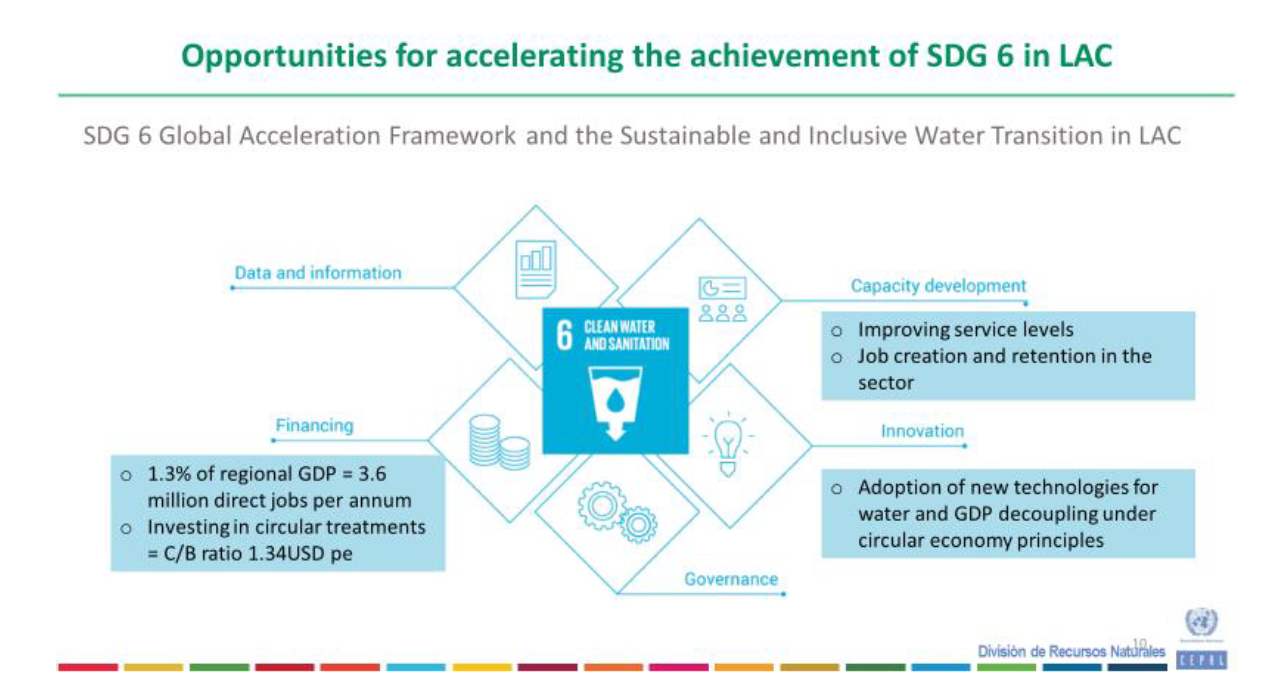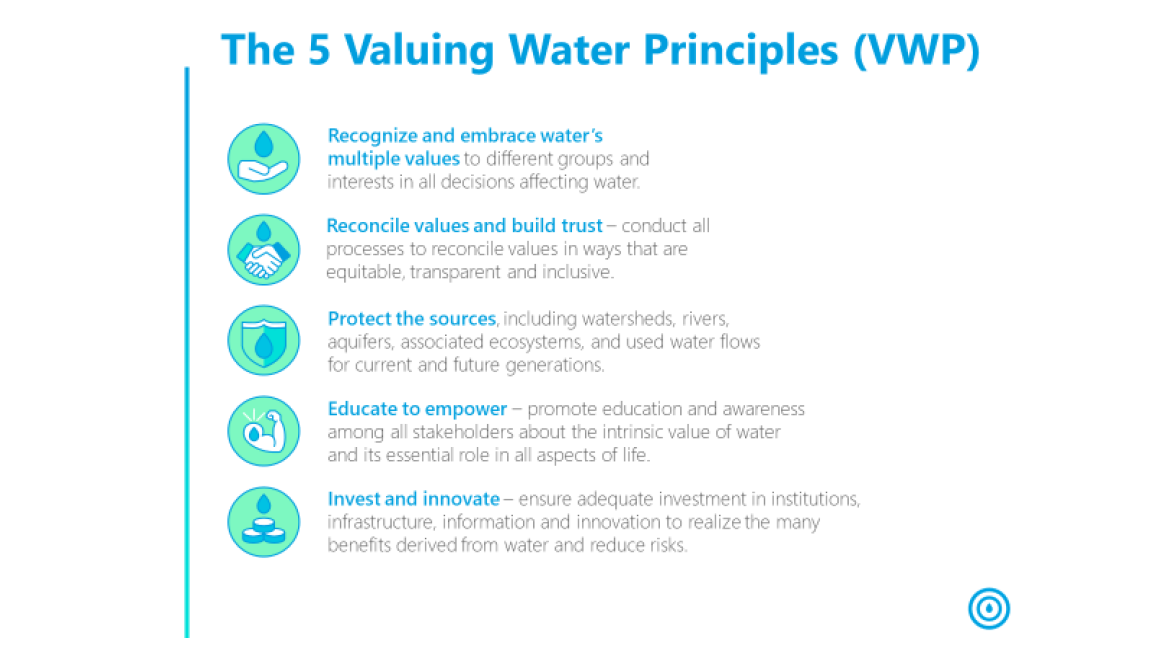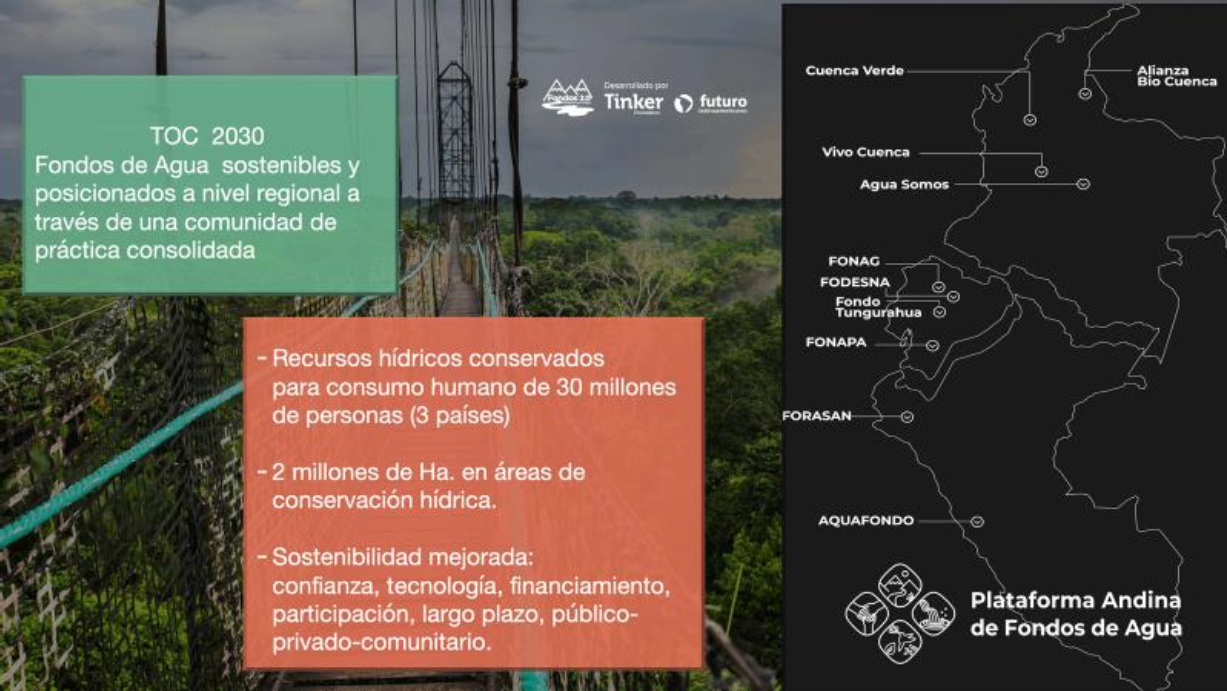Why is Valuing Water important for the UN Water Conference?
Webinar:
14 December 2022
In December 2022, the Valuing Water Initiative (VWI), in collaboration with Deltares and the Global Water Partnership (GWP), organized a first webinar with a focus on Latin America (December 7) and second webinar with a focus on the Caribbean (December 14), as part of the regional process inspired by Valuing Water. This regional process will inform the United Nations Water Conference in March 2023 on the application of the principles for Valuing Water in the region. The webinar served as a platform for successful case studies in the region to be presented to a total audience of more than one hundred and fifty participants, in order to understand how the adoption of the Principles for Valuing Water can contribute to better decision making that impacts water or are impacted by water.
The event, moderated by Reinaldo Peñailillo and Begoña Arellano, both from Deltares, began with a presentation by Dr. Silvia Saravia, Economic Affairs Officer, Water and Energy Unit, Natural Resources Division of the Economic Commission for Latin America and the Caribbean (ECLAC), who gave an overview of the various water challenges faced in the region, among which it stands out that:
- 2.5 out of 10 people do not have access to safely managed drinking water;
- 7 out of 10 people do not have access to safely managed sanitation;
- Access to water is still inequitable, with the poorest quintile having 25% less access than the richest quintile, but paying proportionally up to 2 times more for drinking water and sanitation services;
- While there is a water supply in the region that is four times higher than the world average, paradoxically there are temporal and spatial zones with high water stress;
- There are low levels of efficiency in the sector, compared to the world average;
- Water related disasters have doubled in the region;
- There is an increase in the contamination of water bodies.
Particularly in the Caribbean region, urgent water concerns include the limited access to water and sanitation, groundwater depletion, and water-related disasters. The challenges of water availability and water stress were also highlighted.
The foregoing translates into a lag, if not a setback in some cases, in meeting the different targets of the Sustainable Development Goals (SDGs) in the region. To face these challenges, ECLAC presents a proposal for an Inclusive Water Transition for the region based on i) the human right to water and sanitation, ii) equitable and affordable access, iii) the reversal of negative externalities, and iv) the promotion of innovative practices. To accelerate the successful achievement of SDG 6 “Clean water and sanitation” for all, and of the water and sustainable transition, ECLAC envisions opportunities through the SDG 6 Global Acceleration Framework, with its five accelerators: Financing, Data and information, Capacity Development, Innovation and Governance (see Figure 1).

Figure 1. Opportunities for the acceleration of SDG 6 in Latin America and the Caribbean (LAC)
With a view to the United Nations Water Conference, to be held in March 2023 – the first Conference of this type since 1977 – ECLAC is organizing the 2023 Regional Water Dialogue from February 1 to 3, an event in a hybrid format which aims to understand the priorities for action at the regional level and to have a strengthened position to be presented at said global Conference.
The Valuing Water Initiative was introduced by Sofía de la Rosa Solano, VWI advisor, who explained that the Initiative is currently hosted by the Government of the Netherlands and has emerged from the High-Level Water Panel, which was convened by the UN and the World Bank in 2016 to support the implementation of SDG 6 globally. The Panel embodied its recommendations on the subject in five Principles for Valuing Water (see Figure 2), which today are promoted, and their implementation supported, by the VWI.
Subsequently, Sofía de la Rosa Solano highlighted that, according to the VWI theory of change to contribute to the achievement of the SDGs through better decisions that impact water, the valuation of water can be economic, environmental and/or social, and requires the consideration of multiple water values and systemic dynamics. Presenting some journeys that the VWI has supported (Youth Journey, Financial Sector Journey, and Peru Journey), she invited the audience to reflect on how this lens of valuing water can contribute to better decision-making in the region that recognizes and reconciles the multiple values of water, contribute to systemic change, and that in turn are inclusive, transparent, and equitable. Finally, Sofía stressed that this reflection, which will also continue in the ECLAC Regional Water Dialogue, can constitute an important regional input to the Water Conference in March 2023.

Figure 2. The 5 UN Valuing Water Principles
Each of the webinars followed an interview session with case studies from the region that exemplify the Principles for Valuing Water.
Update of the Water Resources Management Plan for the Chancay Lambayeque Basin, Peru
William Salas, specialist in water resources of the Water Resources Council of Chancay Lambayeque Basin in Peru, explained the work of updating the Water Resources Management Plan and the incorporation of the valuing water perspective, supported by the VWI, with the objective that the approach is subsequently addressed at the national level. In particular, and in relation to the protection of water sources (Valuing Water Principle 3), William mentioned that the basin benefits from a percentage of water tariffs that is used to carry out restoration and conservation actions. In addition, the Water Resources Council seeks to generate better information and greater awareness among the population, including through the introduction of Integrated Water Resources Management in school curricula. This is an example of the Valuing Water Principle 4.
Dipilto Basin Program in Nicaragua
Máximo Angulo, National Coordinator and Technical Advisor on Water Governance, spoke about the work of the Cuenca Dipilto Program in Nicaragua, which works in partnership with eight institutions and two municipal governments, through public-private agreements with the full participation of local stakeholders, including the promotion of women in management positions. The Program allows innovative investments (Valuing Water Principle 5) in sustainable projects in the basin and in strengthening the capacities of basin committees at the community level, highlighting that such investments allow leveraging other contributions.
Andean Platform of Water Funds
Pablo Lloret, Executive Director, Fundación Futuro Latino Americano, presented about the Andean Platform of Water Funds and the 10 Water Funds in Colombia, Ecuador and Peru, which collectively ensure the availability of water for 30 million people, as financial mechanisms, multi-stakeholder governance mechanisms and, above all, generating a foundation of trust (see Figure 3). The presentation explained how the Water Funds protect supply sources (Valuing Water Principle 3), but in practice they represent a translation of the five Valuing Water Principles at the scale of a basin and a city. He emphasized the first Water Fund, in Quito, which began in 2000 with 20,000 dollars, and now has a 30-million-dollar trust fund to invest in actions to conserve the supply sources of the city of quit.

Figure 3. Andean Platform of Water Funds
Aconcagua Network, Chile
Karymy Negrete, Circular Economy Area Manager, Greenticket, presented the Aconcagua Network of Chile, explaining that the country has faced one of the longest droughts in its history, and consequently the Aconcagua basin suffered water shortage. One of the most important agricultural products in the area is the avocado, which is exported to the Netherlands to be distributed throughout Europe. The approach adopted has allowed avocado buying companies to come together in a network to generate a collective action plan for producers for the coming years, seeking to improve decision-making in the face of adverse water conditions. The work of the Network is an example of the Valuing Water Principle 2, among others.
Project Manos al Agua of the National Federation of Coffee Growers of Colombia
Rodrigo Calderón, Director of Social Development of the National Federation of Coffee Growers of Colombia, spoke about the Manos al Agua Project, as an integral management model for coffee micro-watersheds in Colombia. Through this project, the National Federation, an association of 50 institutions, including companies such as Nestlé, Nespresso, national and international public entities, sought to strengthen the resilience of the coffee sector in the face of water and climate challenges. He explained that Manos al Agua managed to intervene in 150,000 hectares with an investment fund of 25 million dollars, of which 20.5 million were from the partners, and 4.5 million were contributions in kind, with a series of benefits not only in terms of water, but also in well-being, health, care for the
environment and the fight against climate change. In this way, 11,630 families were able to benefit, exemplifying the Valuing Water Principle 1.
Adopt a River Initiative, Trinidad and Tobago
Avril Alexander, Project Manager of the Water Resources Agency in Trinidad and Tobago, explained the Adopt a River initiative which aims to deal with the issues of water pollution. The initiative brings together a variety of stakeholders (NGOs, government, schools, etc.) in the management and protection of water resources. Education and awareness raising are key elements of the Initiative and an example of the Valuing Water Principle 4. As part of the initiative, several community-based projects were carried out such as tree planting and environmental education campaigns. Part of the adopt a river program involves water quality testing as a way of raising awareness among youth. Avril discussed how they use education campaigns to teach farmers the types of chemicals and farming practices that are not harmful to the environment. Some other methods to raise awareness employed by the initiative include: enhanced training program for water warriors, social media outreach, competitions, and games.
Santo Domingo and Yanque del Norte water pools, Dominican Republic
Patricia, Executive Director of the Santo Domingo Water Fund, presented the two water funds that were established in Dominican Republic, namely the Santo Domingo and the Yanque del Norte water funds. She shared the functioning of the water funds and how they work with water intensive users and communities in the basins. Some of the initiatives focus on nature-based solutions, while others aim to transform policies into useable knowledge to promote the conservation and management of water resources (Valuing Water Principle 5). The water funds conservation programs are implemented over a 3-5 years period and focused on reforestation, and improving lives of communities helping them to exploit resources sustainably. The funds are invested in education and capacity building programs to equip the communities with tools and life skills required to protect the water resources (Valuing Water Principle 4).
Kee Farms project, Jamaica
Dean Morris, Co-founder, presented the Kee Farm project which works on the restauration of marine life and biodiversity through sea weed production. They have been tracking water usage and giving tools to fisherman to monitor their water demand. They have seen a significant reduction of the water used by fisherfolks as part of their economic and social activities (Valuing Water Principle 2). The project is implemented in close collaboration with the community e.g., locals helped co-design the raft used for seaweed production. Local community knowledge was taken into consideration and incorporated, which is a key contributing factor the success of this initiative (Valuing Water Principle 1). The youth have been also involved in preserving and growing sea weeds. Youths are at the frontline and benefit directly especially from the fish farming activities which bring financial benefits to the community.
Model of Biocultural Adaptation to Climate Change from amphibious cultural practices, Colombian Caribbean: Management of indigenous knowledge
Cristal Ange, Executive Director of Herencia Ambiental, presented an initiative implemented in Colombia with the Zenu indigenous group who are known for living in areas affected by hydro extremes. The project aims to understand and build on the indigenous knowledge of how to live with
the floods and droughts (Valuing Water Principle 1). Some of the existing amphibious cultural practices include building monticules and ecological afforestation. This initiative considers the value of water not just in conservation but as a model for climate change adaptation. The indigenous community plays a leading role in this initiative, especially the elderly who had a greater understanding of ancient cultures. The youth help creating new opportunities through building eco-tourism models. Planned investments focus on the economic value of water but equally keeping in mind that water has more than economic value (Valuing Water Principle 5).
The interviews with the speakers about their success stories allowed to shed a positive light on how the adoption of the five Valuing Water Principles can contribute to improving the water conditions of the localities, both physical and governance, and thus accelerate the progress towards SDG 6, as well as other related basic needs. In the same way, through the presentations, some additional success factors were highlighted, such as the need to have a bottom-up approach, where the interests and values of local users are reconciled through their active participation; and how a systemic change requires time, so a path beyond the life cycle of a specific project must be followed.
The next stop on the regional Valuing Water process? Prior to ECLAC’s Regional Water Dialogue, on January 31 a working session will be held in Santiago, Chile with initiatives in the region that are interested in learning about the application of the valuing water perspective in their local cases. During the Water Dialogue, with the support of VWI, on February 3 a session will be dedicated to the topic of valuing water. For further information, please contact reinaldo.penailillo@deltares.nl, begona.arellanojaimerena@deltares.nl or viviane.malveiracavalcanti@deltares.nl.